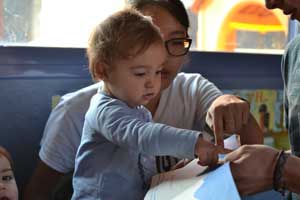When the going gets tough, the tough ought to thank their fathers.
New research from Brigham Young University shows that dads are in a unique position to help their adolescent children develop persistence.
BYU professors Laura Padilla-Walker and Randal Day arrived at these findings after following 325 families over several years. And over time, the persistence gained through fathers lead to higher engagement in school and lower rates of delinquency.
“In our research we ask ‘Can your child stick with a task? Can they finish a project? Can they make a goal and complete it?'” Day said. “Learning to stick with it sets a foundation for kids to flourish and to cope with the stress and pressures of life.”
The scholars from BYU’s School of Family Life report their findings June 15 in the Journal of Early Adolescence.
“There are relatively few studies that highlight the unique role of fathers,” Padilla-Walker said. “This research also helps to establish that traits such as persistence – which can be taught – are key to a child’s life success.”
The key is for dads to practice what’s called “authoritative” parenting – not to be confused with authoritarian. Here are the three basic ingredients:
- Children feel warmth and love from their father
- Accountability and the reasons behind rules are emphasized
- Children are granted an appropriate level of autonomy
|
|
About 52 percent of the dads in the study exhibited above-average levels of authoritative parenting. Over time, their kids were significantly more likely to develop persistence, which lead to better outcomes in school and lower levels of delinquency.
This particular study examined 11-14 year olds residing in two-parent homes. Yet the study authors suggest that single parents still may play a role in teaching the benefits of persistence, which is an avenue of future research.
“Fathers should continue to try and be involved in their children’s lives and engage in high quality interactions, even if the quantity of those interactions might be lower than is desirable,” Padilla-Walker said.






